The sporting world had its ups and downs, and for every high moment, there was also a low. New talents were discovered across sports worldwide, building bright futures in their sports, but we also lost sporting icons who had built long, successful careers and become known to fans worldwide.Some lived their lives to their fullest, while many others’ lives were cut tragically short in their prime. Here, we pay tribute to eight big names from the world of sport who breathed their last this year:
#1 Jagmohan Dalmiya
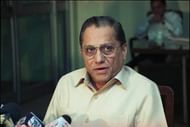
Serving his second term as President of the Board of Control for Cricket in India, Jagmohan Dalmiya passed away in September this year after suffering a cardiac arrest. The Kolkata native was considered one of Indian crickets finest administrators, and was one of the key figures responsible for the sport becoming as big a financial phenomenon in the country as it is today.
Dalmiya is credited with transforming the nature of the game and the way tournaments are now structured, and won a series of awards for his administrative skills; responsible for the Bangladesh side being granted test status, he brought the subcontinent to repute in international cricket.
It was Dalmiya who conceived the idea of TV rights for match telecasts, something that today is considered par for the course. His achievements saw him eventually elected the president of the International Cricket Council (ICC) in 1997 by unanimous vote, and he served in that capacity for three years before falling out with the organisation.
Re-elected BCCI President in 2015, Dalmiya was unable to attend meetings regularly due to his health.
The visionary, an able administrator and a clean figure in a part of the game that was marred by corruption, Dalmiya suffered a cardiac arrest on the 17th of September, and passed away in hospital three days later.
#2 Jonah Lomu
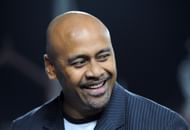
Rugby superstar Jonah Lomu made his international rugby debut in 1994, and immediately came to international renown. The youngest-ever All-Black he was 19 years old when he made his debut for the national side, Lomu was instrumental in the side reaching the finals of the Rugby World Cup the following year, although the team had then lost to the Springboks (South Africa).
That same year, 1995, Lomu was diagnosed with nephrotic syndrome, a kidney disorder that can cause serious issues among them total kidney failure.
Lomu took a short hiatus from the sport in the initial days of his treatment, returning to a career where he would see immense success, one that ended with him tied for most goal-score tries fifteen of them, in fact, a record that would only be tied by South Africa's Bryan Habana in 2015.
In addition to the national side, Lomu played with a series of domestic teams during his career. The World Cup legend was a force to reckon with on the field, but off it, he was a gentle giant.
His illness worsened in 2002, and Lomu took a break until 2005 as he had a kidney transplant and rested in the interim. Even after this, however, he returned to his old form, even putting in a man-of-the-match performance in one of his league matches. The injuries he would end up suffering took a toll on his career, and although he was part of a number of match-winners for a time, Lomu would eventually retire from the sport in 2007, only playing in a few charity matches thereafter.
He also dabbled in bodybuilding for a time.
Lomu passed away of a heart attack related to his kidney disorder in 2015, one day after returning from a journey to London. Following his death, a trust was set up to support his sons.
#3 Richie Benaud
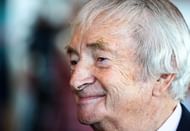
One of crickets most recognizable voices, Benaud was an immensely successful cricketer before he decided to train as a presenter and eventually moved to commentating instead.
The first ever cricketer to reach both 200 wickets and 2000 runs, Benaud was an all-rounder whose specialty was leg spin. At the height of his cricketing career in the 1950s and 60s, he was widely regarded as having revitalised Australian cricket, which had been in a slump.
A lower-order batsman, Benaud also hit a number of centuries in his earliest years on the team, and played crucial roles in the team's wins.
Called up to captaincy in 1958 after then-captain Ian Craig fell ill, Benaud took over the role with aplomb. Despite not having much prior leadership experience, Benaud led the side in the Ashes against a strong English side that year, contributing as a captain and with bat and ball as he led from the front to give Australia the Ashes again.
A brilliant cricketer, he was also an able captain, and the side flourished under his leadership. Aggressive in his captaincy and his style of play, Benaud was legendary for how he was able to turn the ball.
His first tryst with presenting came in 1956 when, fresh off a tour of England, he enrolled in a BBC training course, taking up a job with News of the World in London soon after. Following his retirement in 1964, Benaud took to cricket journalism full time, dividing his time between the United Kingdom and Australia.
He was known for his dry wit, and not prone to bombastic generalisations as so many of his contemporaries and successors are. Peppering his incredibly astute commentary with cutting humour, he was one of the most knowledgeable, entertaining voices in the history of the game.
Benaud was diagnosed with cancer in November of 2014, and passed away this April at the age of 84.
#4 Jules Bianchi
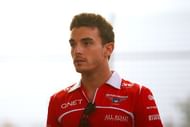
One of the most tragic deaths of the year, Jules Bianchis passing rocked the world of Formula One.
The talented young French driver began in Formula Renault at 16, and in his first year out of karting won the championship. He then took championship titles at the Masters of Formula 3 at Zolder, and the Formula 3 Eurocup the latter of which he managed to confirm even before the end of the season.
His Formula One career began as a test driver for Ferrari, who are alleged to have considered him as one of the possible replacements for a seriously injured Felipe Massa in 2009. He would go on to become the first ever recruit of the Ferrari Drivers Academy, and in 2010 the team announced he would be their test and reserve driver. He remained with them until 2012, when he was out on loan to Force India whilst still signed to Ferrari.
He made his race debut in 2013, and although Manor had a lackluster year, he scored the teams first ever championship points in 2014 at Monaco. Former employers Ferrari had noticed his talent, and with two-time World Champion Fernando Alonso ready to leave the Scuderia at the end of that season, Bianchi had been pipped to take his place something he had himself been confident of.
But life tragically had other plans, and it all changed at that years Japanese Grand Prix.
The Suzuka Circuit, drenched by the rain in the wake of Typhoon Phanfone, had organisers worried ahead of the 2014 Japanese Grand Prix. The race went on as scheduled, however, with a wet, but fairly uneventful qualifying session.
Race day, however, would bring tragedy to the sport. With visibility and traction seriously hampered in the rain, German driver Adrian Sutil crashed his Sauber, immediately causing the safety car to be brought out, as cranes worked to remove the wreckage. Sutil, thankfully, had walked away from the wreckage.
Immediately during the next lap, however, Jules Bianchi crashed his Manor-Marussia into a stationary crane that had been clearing bits of Sutils Sauber. Bianchi was left unonscious in the high impact crash, and removed immediately to the nearest hospital in the Mie Prefecture to reduce swelling to his brain.
Scans revealed the young Frenchman, then only 24-years-old, had suffered an irreparably traumatic brain injury. He would remain comatose until his death in July 2015 the first death in Formula One since that of Ayrton Senna in 1994.
#5 \'Rowdy\' Roddy Piper

The WWE Hall of Famer, born Roderick George Toombs, had a rough childhood. After a falling-out with his father, Piper slept rough for a while before working for professional wrestlers and assisting them with errands as a young man.
Considered one of WWEs best bad guys, Pipers aggression in the ring was legendary. He had iconic rivalries with Hulk Hogan and Ric Flair, and despite never winning a WWE world title, was considered one of the greatest in the sports history.
Piper started out as an amateur boxer and wrestler, and earned his black belt in Judo before embarking on a full-time professional wrestling career. It was then that his friends began playing the bagpipes as he entered the ring, which is where he got the name Piper.
He started off in the National Wrestling Alliance in the mid 1970s, becoming a full-time part of the then-World Wrestling Federation in 1984. With owner Vince McMahon, Piper began what became the best talk show in WWF history Pipers Pit, during the course of which he wrestled A-Team legend Mr. T.
After a short hiatus, Piper returned to take part in WCW (World Championship Wrestling) and found success. He was one of the few wrestlers who has headlined Starcade (WCWs major event) and Wrestlemania.
During his second return to WWE (between 2005 and 2015), Piper was inducted into the WWE Hall of Fame, and joined one-time rival Ric Flair to win the Tag Team Championship, which would be his final ever title in WWE.
He left behind a legacy that several other bad guys in WWE have attempted to emulate, most notably among them CM Punk.
Piper beat cancer in 2007, but suffered a cardiac arrest as a result of an embolism, and passed away in July 2015 at the age of 61.
#6 Junior Malanda

Part of the newest generation of exciting football talent in Belgium, Malanda captained the Belgian national Under-19 team aged 17.
After stints with Belgian football clubs in his early teens, Malanda moved to France, signed by Lille, and remained with them until 2012. In 2013, he was signed by German club Wolfsburg, scoring two goals for his team, with Wolfsburg winning each of those matches.
Unfortunately for Malanda, an injury forced him to sit out the remainder of the 2013-2014 season, but he was due to return in 2015.
In January 2015, on his way to catch his flight to a training camp in South Africa, Malanda had been travelling in the backseat of a vehicle that crossed a guardrail and careened into a tree. Jolted from the car by the impact, Malanda, who was not wearing a seatbelt, was killed instantly.
His death was condoled by several footballers, among them Bayerns Mario Gotze and one of Malandas closest friends, City footballer Kevin De Bruyne.
#7 Flip Saunders
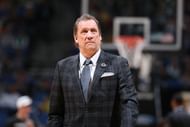
Iconic NBA coach Flip Saunders was a professional basketball player in his youth. One of the best players at varsity, Saunders began coaching college basketball teams, and had an impeccable record straight off the bat.
He moved up to the CBA (the Continental Basketball Association) in 1988, and after seven very successful seasons in the league, moved to the NBA to begin his first coaching stint with the Minnesota Timberwolves. Although he started as their general manager, he took over as head coach and the next year, his first full season as head coach, he led the team to their first winning season.
Saunders was also largely responsible for the discovery of NBA legend Kevin Garnett.
Following a number of very successful years with the Timberwolves, Saunders was fired after the teams struggles in 2004, but took over the coaching role at the Detroit Pistons the following year, with the team setting a new franchise record for wins under his leadership.
After a less than stellar three years with the Washington Wizards, Saunders returned to his old team the Timberwolves in 2014. He was diagnosed with Hodgkins lymphoma (a type of cancer), but planned to stay on as head coach and president of the team. Several complications arose during his treatment that prevented this, however, and Saunders passed away this October.
He was 60 years old.
#8 Dusty Rhodes
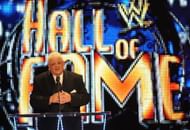
One of the greatest talkers in the history of the WWE, Rhodes was known for his jokes, his wit and spontaneity. He broke the stereotype of muscle-men to achieve success that many would not have expected of him, considering Rhodes was grossly overweight and did not fit the typical image one associates with a WWE wrestler.
Like most wrestlers, Rhodes began his foray into wrestling through the National Wrestling Alliance (NWA), and from the start came to be known for his charismatic, friendly nature.
Rhodes was part of the WCW in the early 1990s, and one of his biggest rivals at the time was Big Van Vader, whom he defeat to win the WCW World Heavyweight Championship in 1992.
In his later career, Rhodes became a mentor of sorts to several younger talents in WWE and NXT, and guided Irish wrestler Finn Balor.
Rhodes sons, Dustin (Gold Dust) and Cody, are also in the WWE, but have not had the success their father enjoyed.
The wrestler developed stomach cancer in his later years, and following a fall at his home in June, Rhodes was taken to hospital, where he passed away the following day.
